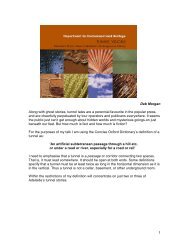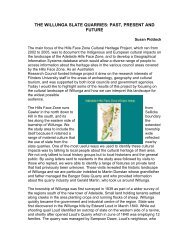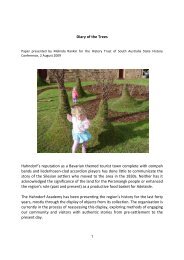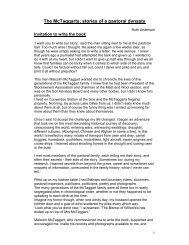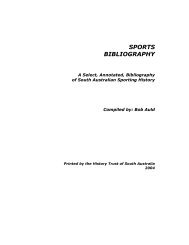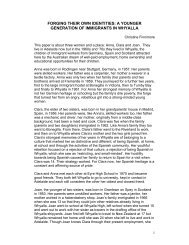Southward Bound Information - History SA
Southward Bound Information - History SA
Southward Bound Information - History SA
Create successful ePaper yourself
Turn your PDF publications into a flip-book with our unique Google optimized e-Paper software.
Boredom and unpleasant weather quickly led to arguments, flaring tempers and<br />
occasionally even fisticuffs. With deck space always at a premium, if the ship was<br />
caught in the doldrums, or when passing through the tropics, the surgeon often<br />
introduced a roster to permit everyone to have a turn on deck. On occasions the<br />
same idea was employed to ration the deck space for sleeping to make sure that<br />
everyone had some time on deck at night during the worst of the heat.<br />
Unpleasant as it may have been for the passengers, it was alarming for the<br />
captain to find his ship delayed through lack of wind. If the hold up was prolonged<br />
a shortage of water could develop, and food supplies began to run short. This<br />
could mean a call at Rio De Janeiro or Cape Town. That was a costly matter and<br />
some of the crew could desert. Worse, a visit to Rio could result in the ship<br />
becoming contaminated with some epidemic disease as that port was notoriously<br />
unhealthy.<br />
Apart from the cost of provisions or water, the call at the port meant the trip was<br />
prolonged and may result in a greater consumption of stores and the payment of<br />
the harbour and dock dues. All expensive and to be avoided if at all possible.<br />
A visit to Rio either planned or forced upon the captain by the vagaries of the<br />
elements, was none to pleasant for most of the passengers as they most likely<br />
would have to remain aboard. The vessel would invariably anchor off and while<br />
some of the cabin, and perhaps some of the intermediate passengers, may obtain<br />
permission to visit the shore, it was most unlikely the privilege would be extended<br />
to those in steerage.<br />
On the other hand, a visit to Cape Town, planned or not, normally meant that the<br />
migrants could take a short run ashore. If water became scarce when the ship was<br />
in the vicinity of South Africa it was more likely to find the captain heading for<br />
Tristan d’Achuna. Here water was free or could be obtained for a trivial outlay.<br />
The cost of water at a commercial port, combined with the almost inevitable loss of<br />
a few crew, plus the port charges, caused many a captain to reduce the water<br />
ration rather than try to obtain additional supplies. Such a step could, and<br />
sometimes did lead to trouble on arrival in Australia but to the majority of captains<br />
that seemed the lesser of the two evils.<br />
Irrespective of a call at any port in the South Atlantic the ship always headed<br />
across that ocean from the “bulge” of North Africa to the region of Rio before<br />
making for a point well to the south of the Cape of Good Hope when the ship was<br />
turned to Australia. All captains sought the Roaring Forties of latitude to be found<br />
in that vicinity. These constantly blowing winds, although often producing<br />
uncomfortable conditions aboard the ship, materially shortened the trip. For this<br />
reason alone they were generally welcomed - even by the migrants. Fortunately<br />
by the time the ship reached those latitudes about three quarters of the time<br />
usually taken for a voyage had elapsed and the average traveller had become<br />
accustomed to shipboard life and was more able to withstand the rigours of the<br />
last lap. These low latitudes are nearly always cold and icebergs are frequently to<br />
be seen. If the wind, or poor navigation, put the ship too far south icebergs<br />
became a great danger and the frequently foggy, misty or hazy atmosphere made<br />
it difficult to discern navigational hazards at any distance, thus increasing the



